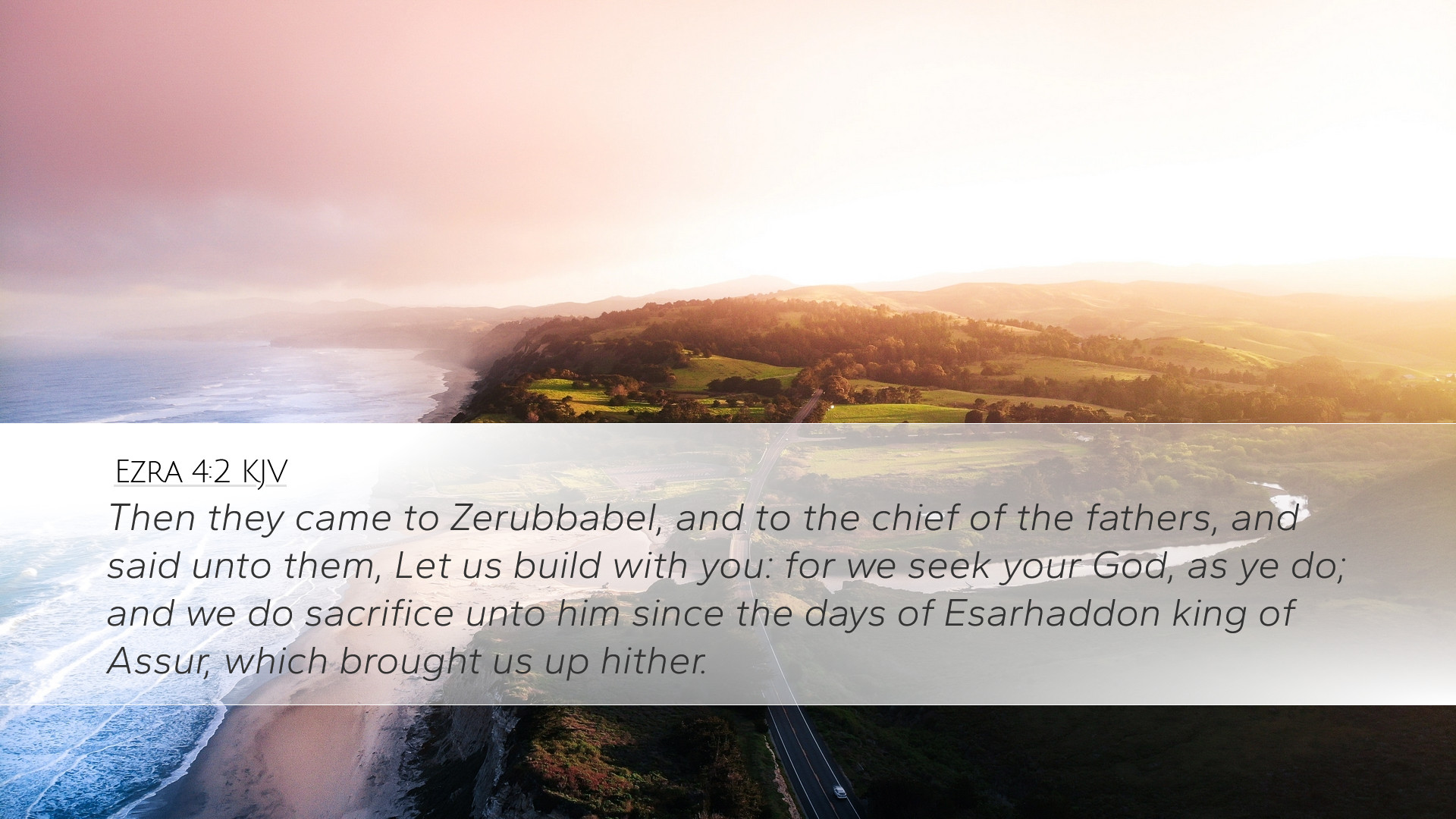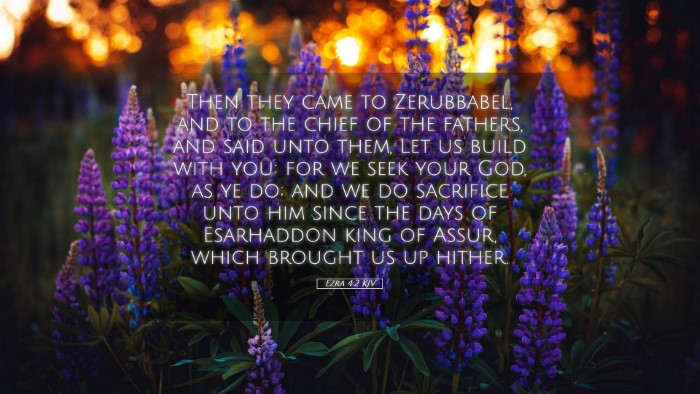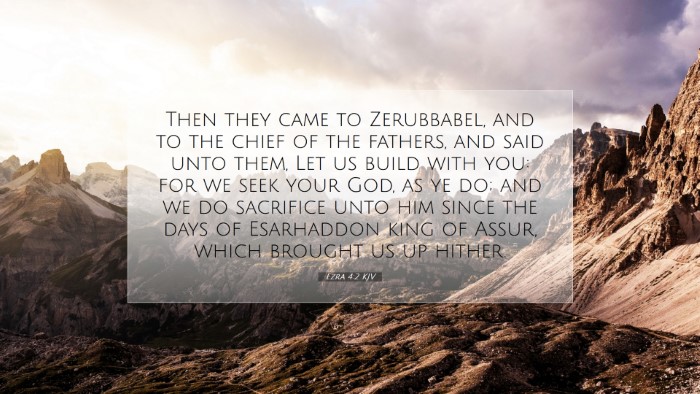Old Testament
Genesis Exodus Leviticus Numbers Deuteronomy Joshua Judges Ruth 1 Samuel 2 Samuel 1 Kings 2 Kings 1 Chronicles 2 Chronicles Ezra Nehemiah Esther Job Psalms Proverbs Ecclesiastes Song of Solomon Isaiah Jeremiah Lamentations Ezekiel Daniel Hosea Joel Amos Obadiah Jonah Micah Nahum Habakkuk Zephaniah Haggai Zechariah MalachiEzra 4:2
Ezra 4:2 KJV
Then they came to Zerubbabel, and to the chief of the fathers, and said unto them, Let us build with you: for we seek your God, as ye do; and we do sacrifice unto him since the days of Esarhaddon king of Assur, which brought us up hither.
Ezra 4:2 Bible Commentary
Ezra 4:2 Commentary
In Ezra 4:2, we encounter a pivotal moment in the restoration of Israel after the Babylonian exile. The verse states:
"They came to Zerubbabel, and to the chief of the fathers, and said unto them, Let us build with you; for we seek your God, as ye do: and we do sacrifice unto him since the days of Esarhaddon king of Assur, which brought us up hither."
Context and Background
This verse occurs as the Israelite exiles are returning to Jerusalem to rebuild the temple and re-establish their worship. The book of Ezra outlines the challenges faced by these returnees, including external opposition and internal strife. Understanding the significance of Ezra 4:2 requires an awareness of the surrounding socio-political landscape.
Analysis of the Verse
Ezra 4:2 is notable for the interactions of the returning exiles with the surrounding peoples. It serves as a statement about the complexity of Israel’s relations with neighboring nations. Here are key aspects derived from various public domain commentaries:
-
Matthew Henry:
Henry emphasizes the duplicity of those who approached Zerubbabel and the leaders of Israel. They feigned a desire to join in the building of the temple, suggesting a common faith, but likely had ulterior motives aimed at diluting the purity of Israel's worship and reclaiming influence over the region.
-
Albert Barnes:
Barnes provides insight into the identity of these interlopers. He refers to them as "the adversaries of Judah and Benjamin," highlighting their previous engagement with the Israelites and their previous collaboration in the syncretistic practices that characterized the Assyrian influence over conquered peoples. This illustrates the tension between genuine worship and diluted practices.
-
Adam Clarke:
Clarke notes the historical context of the claims made by these individuals of worshipping the same God. He points out the significance of their mention of Esarhaddon, the Assyrian king, to emphasize their mixed religious practices—which included the worship of Yahweh alongside other gods—thereby undermining the foundational commandments of Israel’s faith.
Theological Implications
Ezra 4:2 offers rich theological reflections pertinent to today's church and scholars:
-
Unity in Worship:
The desire of outsiders to join in worship raises questions about the nature of communal worship and the integrity of spiritual practices. It challenges modern congregations to consider who is accepted within worship settings and the importance of doctrinal purity.
-
The Danger of Compromise:
This verse also illustrates the danger of compromising one’s distinct identity in worship to gain broader acceptance. It beckons the question of what compromises churches might make today in their pursuit of unity and growth, encouraging leaders to consider the true cost of such decisions.
-
The Nature of God’s People:
The response of Israelite leaders to these overtures is critical, showing how God’s people must discern genuine faith from mere participation. The legacy of Ezra and the returnees call for a discriminating heart that seeks to uphold the sanctity of faith.
Application for Today's Believers
For pastors, students, and theologians, the implications of Ezra 4:2 can be distilled into actionable insights:
-
Discernment in Relationships:
Believers are called to exercise discernment in whom they partner with in ministry and mission. Not every collaborative effort is blessed; wisdom is paramount in distinguishing genuine fellowship in faith from mere token inclusion.
-
Commitment to Holiness:
Like the Israelites, Christians today must commit to a life of holiness, avoiding the pitfalls of syncretism whereby the purity of their worship is compromised by external influences.
-
Restoration of Worship:
The overarching theme of rebuilding the temple serves as a metaphor for personal and communal restoration in worship. Addressing the manner and spirit in which we commit to worship is fundamental for sincere adoration of God.
Conclusion
In conclusion, Ezra 4:2 presents a multifaceted view of worship, community, and identity in the context of rebuilding after exile. By synthesizing insights from prominent public domain commentaries, we can appreciate the depth of Scripture's teaching around the interactions between God’s people and those outside their covenant community. This analysis invites readers to reflect deeply on their own practices of faith and community while offering profound lessons on the nature of worship that remains relevant across generations.


